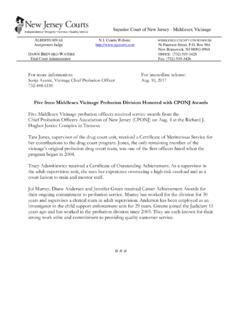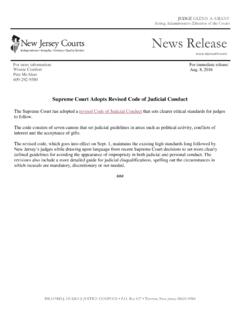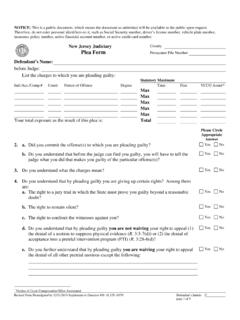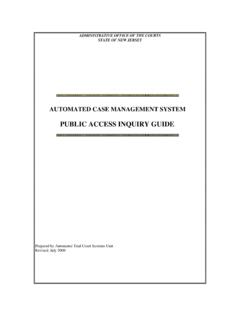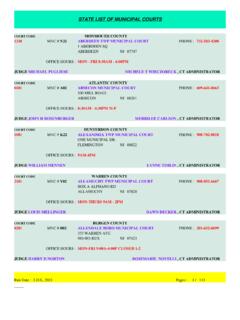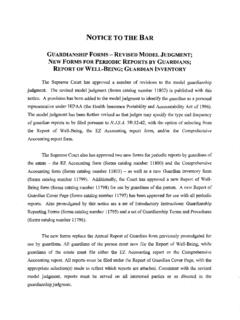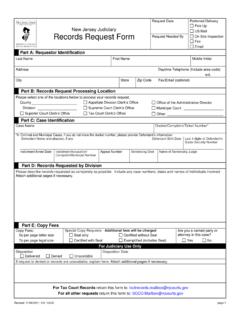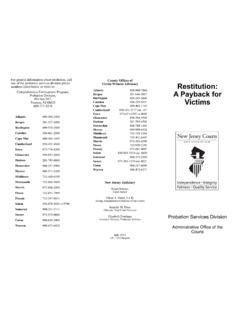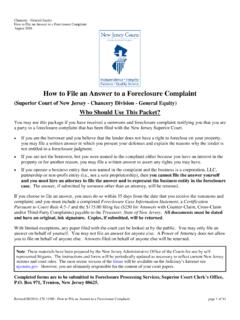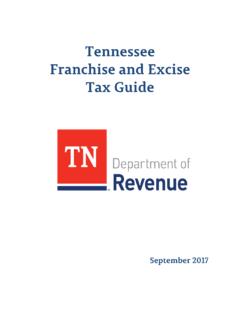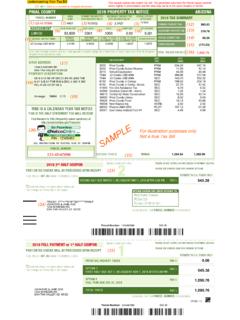Transcription of Collecting A Money Judgment - New Jersey Superior Court
1 New Jersey Judiciary Collecting a Money Judgment Superior Court of New Jersey Law Division Special Civil Part Collecting a Money Judgment Revised 03/10/2022, CN 10282 page 1 If Money is owed you because you have been awarded a Judgment in the Special Civil Part, you are a Judgment creditor. You should contact the person who owes you the Money (the Judgment debtor) to discuss payment. Payments sometimes are made on the day of the Court hearing or over time. If you do not receive the Money that is owed you, there are several ways the Court can help you collect it. Although the Court will try to help you collect the Money owed to you, it cannot guarantee your debt will be paid.
2 The forms for the different methods of collection outlined in this brochure are available in any New Jersey Special Civil Part Office. A complaint packet and an answer packet for self-represented litigants, with accompanying instructions , is available in any New Jersey Special Civil Part Office and is available at Execution on Goods and Chattels (Writ) An execution on goods and chattels (writ) lets the Special Civil Part Officer try to collect the Money owed on a Judgment from the debtor's bank account or personal property . real estate cannot be used to collect Money owed in the Special Civil Part.
3 You must locate and identify, for the Special Civil Part Officer, the debtor's personal property that can be used to satisfy your Judgment . You can, for example, also ask that a Special Civil Part Officer try to sell personal items such as office equipment at a public sale. The debtor can keep $1,000 worth of personal property and wearing apparel. If the debtor does not have more than $1,000 worth in personal property , this method cannot be used by the Special Civil Part Officer to satisfy your Judgment and to collect the Money owed to you. If you ask the Special Civil Part Officer to seize the debtor's motor vehicle, you must be able to show that the vehicle is registered in the name of that debtor.
4 This is done by getting a certified copy of the title and/or obtaining a certified lien search from the New Jersey Motor Vehicle Commission. The debtor might have an outstanding loan or debt on the car, so you must determine if there is value or equity in the debtor s car before you direct a Special Civil Part Officer to pursue it. The fee for obtaining a writ is $35 plus the special civil part officer s $7 service fee. The officer will inform you of additional fees to advertise and sell the debtor s property that is levied upon using this writ and when and if these events occur. A writ is good for two years from the date it is issued.
5 There are no limits on the quantity of writs a creditor can obtain. You cannot choose which special civil part officer will perform this work for you. General Information About Writs and Special Civil Part Officer Fees The Special Civil Part Officer cannot levy on child support, welfare benefits, Social Security benefits, SSI, veterans' benefits or unemployment benefits. Once you apply and the Court issues a writ of execution on goods and chattels (writ) it is assigned to a Special Civil Part Officer for collection. By law, there is a 10 percent fee added to the amount of the Judgment as the officer's commission.
6 This fee is listed on the writ and is payable to the officer as the Judgment is being Collecting a Money Judgment Revised 03/10/2022, CN 10282 page 2 collected. The 10 percent is taken from the Money collected by the officer. Once a writ of execution is issued and it is still active and has not expired (each writ is valid for two years from the date of its issuance), the payments should be made directly to the Special Civil Part Officer and not directly to the creditor. The officer handles the bookkeeping, deducts the appropriate commission and sends the balance to you. If a writ is returned by the officer and he/she marks it as fully satisfied, the Special Civil Part Office will enter the satisfaction of the Judgment in the record.
7 A Special Civil Part Officer s writ return can be marked, as fully satisfied, only if the officer himself/herself collected all of the Money due and owing, which can include Court costs and interest, if any, plus the officer s entire 10 percent commission. In some instances, after a levy has been made by the officer or contact has been made with the debtor, settlement discussions could occur between the creditor and the debtor. In making a settlement with the debtor, remember that the officer, who has made a valid levy or has in some way helped produce payment, is entitled by law to receive 10 percent commission on any amount paid.
8 Any partial or full payment made directly to you is subject to the 10 percent commission that must be paid to the officer. Note that if the officer has served your writ and levied upon a permissible asset (asset gets frozen), the officer must direct the bank or other financial institution to release (unfreeze) the asset at the end of that writ s 2 year expiration date, unless you timely apply for a new writ with instructions given to the officer to re- levy with the new writ upon that asset before it is released back to the debtor. Bank levy If you know or can find out where the debtor has a savings or checking account in New Jersey , you may ask that a Special Civil Part Officer collect your debt from the Money in the account using this writ.
9 Special Civil Part Officers are not required to search for the debtor s bank accounts. You must provide the name of the bank, the address and no more than the last 4 digits of the account number, if possible. Do not provide the Special Civil Part Office with the debtor s entire active financial account number. Provide it to the officer directly if necessary. If there is a new address subsequently provided to the officer where an asset could be available to satisfy the Judgment , an additional $7 fee for service by the Special Civil Part Officer could be charged. After the Money has been levied upon by the Special Civil Part Officer, it is considered frozen.
10 You must then file a Motion to Turn Over Funds with the Court and serve a copy upon the debtor and the bank. A packet for self-represented litigants on How to File a Motion to Turnover Funds is available in any New Jersey Special Civil Part Office and at If the Court grants the motion, the judge will sign the Order to Turn Over Funds that you submitted with your motion. This order will be delivered to the bank by the Special Civil Part Officer. The officer will then obtain the Money from the bank first, deposit it into his/her own officer trust account and then mail a check to the creditor or creditor s attorney by the 15th day of the month following the successful month of deposit.
